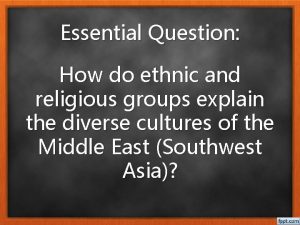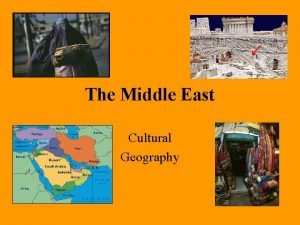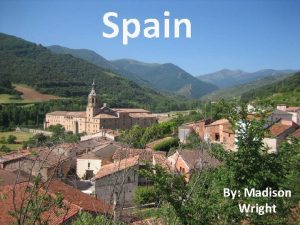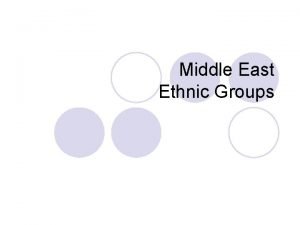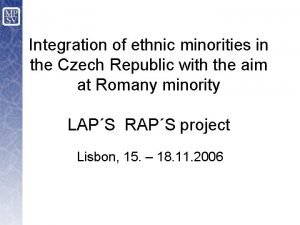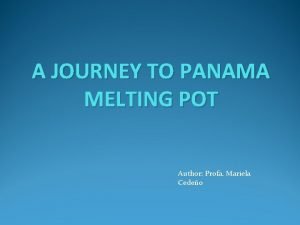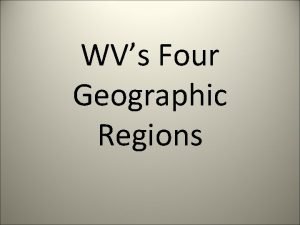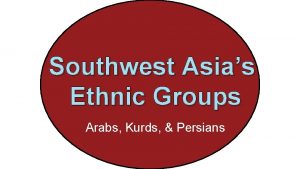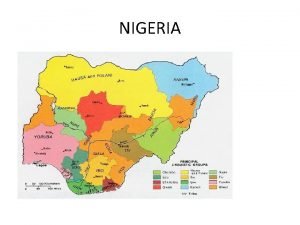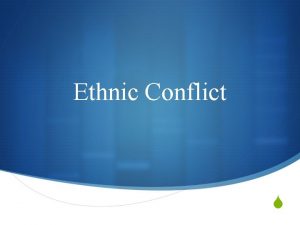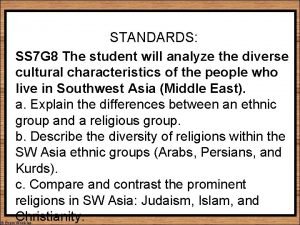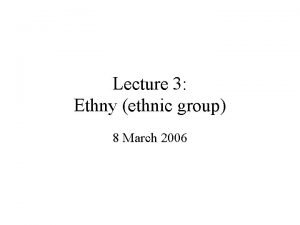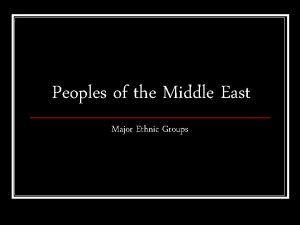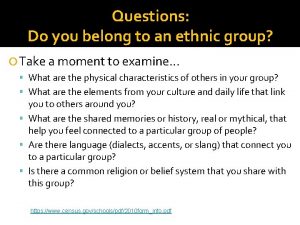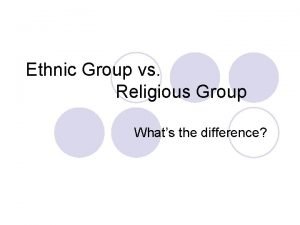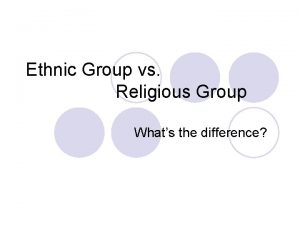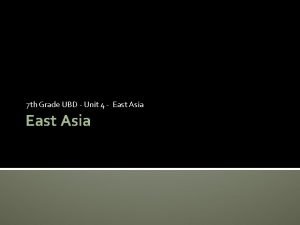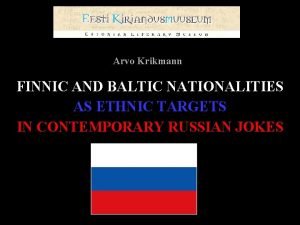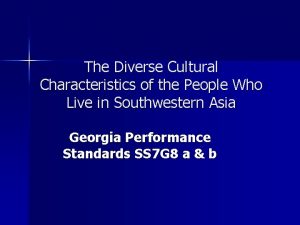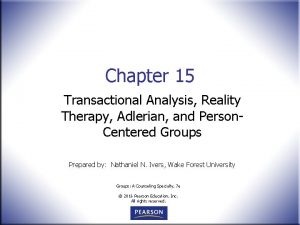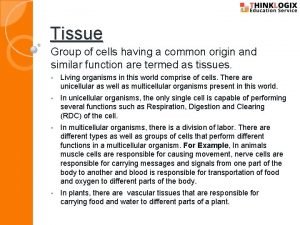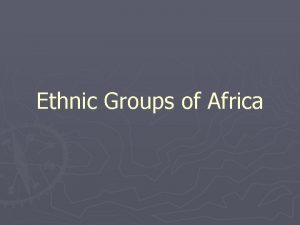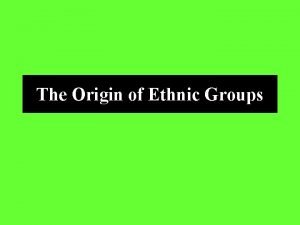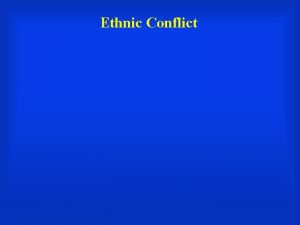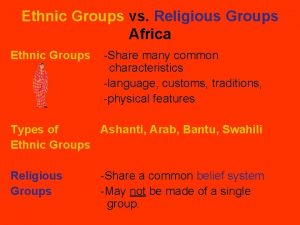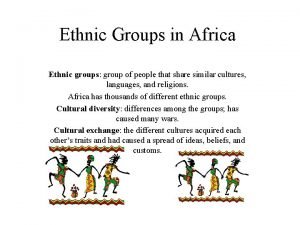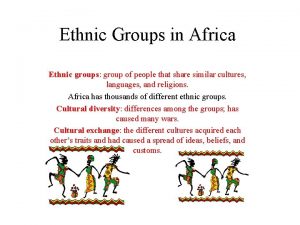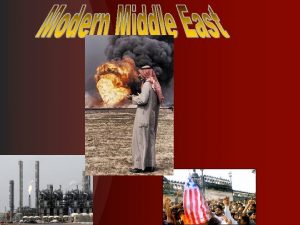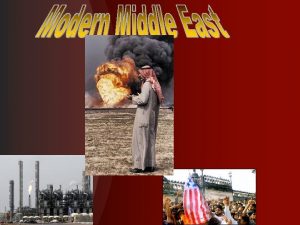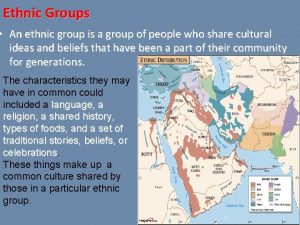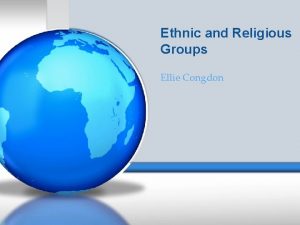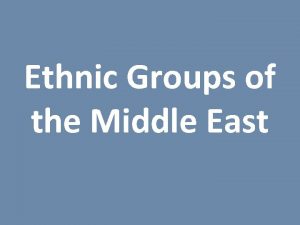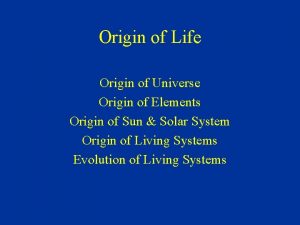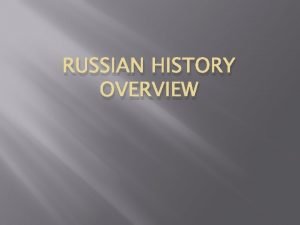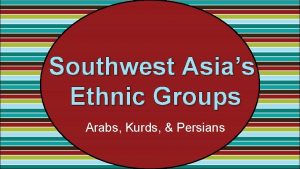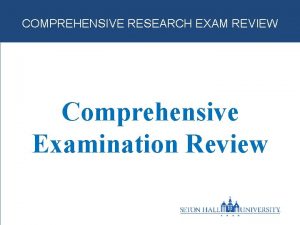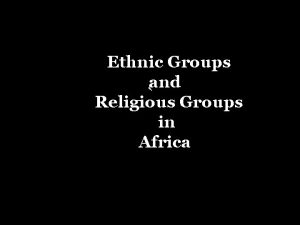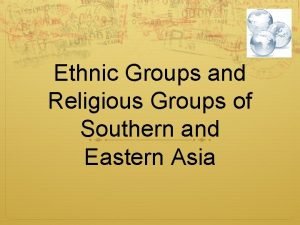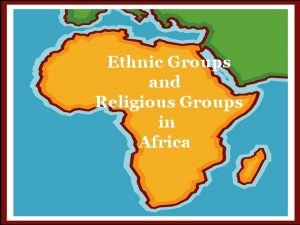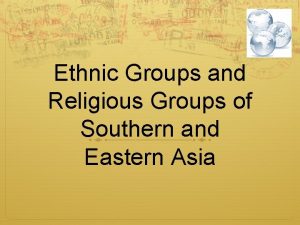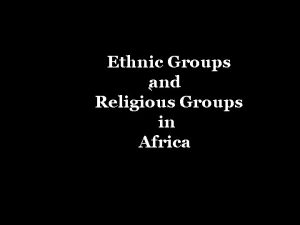The Origin of Ethnic Groups Ethnic Group Comprehensive






























- Slides: 30

The Origin of Ethnic Groups

Ethnic Group Comprehensive Definition • a collective proper name • a myth of common ancestry • shared historical memories • one or more differentiating elements of common culture • an association with a specific 'homeland' • a sense of solidarity for significant sectors of the population

Key Components of Ethnic Groups & Nations • Core - Complex of myths and symbols, fused into one mental image • Boundary – Cultural markers which determine who can be a group member

Culture Zones

Super-Tribes

Limited Ethnogenesis • Coast Salish refers to a cultural or ethnographic designation …who speak one of the Coast Salish languages… but there is no one …people named "Coast Salish". • BUT: ‘First Nations’, also ‘Indian’ and ‘Inuit/Eskimo’ are concrete, politically-relevant ethnic identities

Tribes

“Ethnolinguistic Groups” in Africa • Are these the designations of the insider or outsider? • Which are the relevant designations: smaller or larger groups? ‘Onion’-like nature of ethnicity in Africa • ‘Politically Relevant’ Ethnic Groups (Posner 2004) • Urbanisation and Ethnic assimilation (Wolofisation; Kikuyu-isation; decline of San and Pygmies)

Dissecting the ‘Onion’: Ethnic and Supra-Ethnic Groups

• Language Families (according to Armstrong 1982, these, along with religious divisions, shaped the contours of modern European ethnic groups)


Ethnogenesis • Blood-Soil/ Space-Time • Process of integration/differentiation • Elements: – Name, – Land – Econ/communications – Downward & inward penetration of consciousness/myths – Homogenization of language


Ethnogenetic Processes • Contact between and communication within • Codification of culture, myth, memory, language • Political fortunes wax and wane • Integration and differentiation • Fission and Fusion

Historical Rise of Ethnic Groups • • Many of the world's nations in fact date their foundation from the rise of their core ethnic group (i. e. Germany did not begin in 1871) Origins, from the perspective of Ethno-Symbolist or Historicist-culturalist school (Smith, Armstrong, Hastings) 2 main types of ethnie: 1. Vertical (demotic) 2. Lateral (aristocratic) Lateral-aristocratic (i. e. Turks, English)

Vertical Ethnic Groups 1. 2. 3. 4. 5. Tribal Confederation - Kurds, Arabs, Irish, Zulu. War & migration. Frontier Ethnies - Swiss, Czechs, Armenians, Catalans. Defending the realm, trade routes. City-state amphictyonies- greater identity coexists with city-state: Greek, Persia Diasporas - Pontic Greeks, Lebanese traders, Jews, Armenians, Parsees Religious Sects - Druze, Copts, Sikhs, Mennonites

Colonial Ethnogenesis • Pre-colonial kingdoms, tribal confederations (ie Akan, Zulu, Thai) • Colonial missionaries help to codify languages • Administrators and travellers delineate homelands • Colonialists settle tribesmen in new lands, bring labour together (i. e. Zambian copperbelt) • Native romantic/anti-colonial intellectuals

Celtic Britain • Communities often small scale, but with temporary agglomerations. Also local legends and oral traditions • Rome brings Christianity • Native Celts are organised into tribes • Romans designate provinces and towns • Roman Britain, 410 A. D.

Britain in the 5 th c. AD

Anglo-Saxon England • 5 th Century invasion by Teutonic Angles, Saxons and Jutes • Creation of separate kingdoms • King Egbert brings all of England under his control • Fusion: Celt & Anglo-Saxon blend, Anglo. Saxon Kingdoms unite

Integration: The English Ethnic Group begins to form, c. 650 A. D.

King Alfred the Great of Wessex • This 9 th c. Anglo. Saxon King’s exploits against the invading Scandinavians became enshrined in myth – partly by his own chroniclers, but largely by 18 th and 19 th century English Romantics

Ancient Ethnicity? • English chroniclers, monks like Bede, refer to ‘Anglia’ and its virtues • Welsh (and Britons) begin to refer to themselves as Cymru, or fellow countrymen after 8 th c. • Scottish battles against Norse and Anglo. Saxon – evidence of large-scale unity?

Ethnic Processes in the British Isles • Fission: 1) Welsh, Cornish and Manx from Celtic Britons; 2) Scots from Celtic Gaels; 3) Anglo-Saxons from Greater Germans • Fusion: 1) English from Anglo-Saxons, Jutes, Britons & Normans; 2) Scottish from Scots & Picts • Contact: Welsh and Scots’ unity forged in war against English; English unity in war against Normans, Danes, Celts

Varieties of Ethnic Group in the British Isles • Tribal Confederation: ‘tribes’ of Brythonic Celts form into Welsh in response to Anglo-Saxon attack; ‘tribes’ of Angles, Saxons, Jutes form into an Anglo-Saxon conquest agglomeration – shaped by Danish, Viking, Norman invasion • Lateral-Aristocratic: Scottish and English monarchs sink roots into native population through mobilisation for war and feudal system (Welsh as well); • Diasporas: Scotch-Irish, Anglo-Irish • Sects, Frontier ethnies, City-State Unions: none

Medieval Period • Feudalism established in Wales, England Scotland • Llewelyn the Great sets up ‘state’ on feudal lines in Wales, mid-13 th c. • Malcolm III sets up Scottish kingdom, 1057; David I sets up feudal ‘state’ 1124 -53 • The Norman William I unites England. • Fusion: Anglo-Saxons and Normans intermarry

Ethnicity in the Middle Ages? Yes • English, Welsh and Scots were linguistically distinct cultures & the masses spoke the native tongue • Each were named populations • Battles in the name of ethnicity were fought between groups (English-Welsh, English-Scots) • Each had myths of origin, homelands and political memories • A sense of communal consciousness emerges in native chronicles, which go back to the early middle ages • Even local folk tales preserve memory of wider events (Arthur, Wallace, etc)

No: Modern Ethnic Revivals • • England, late 1700 s Wales, early 1800 s Scotland, early 1800 s Harked back to ancient and medieval events (King Arthur’s Wales, Robert the Bruce’s Scotland, Alfred the Great’s Anglo-Saxons)

One Purported Site of King Arthur’s Tomb, Glastonbury Abbey

Ethnic Revival or Invention ? • Were romantic intellectuals ‘reviving’ or ‘inventing’ myths, memories, identities? • Was there a pre-modern Welsh, Scots and English ethnic consciousness, or were the players in this drama unaware of the larger picture? • Even if consciousness existed – how far down the social scale did it go?
 How are ethnic groups and religious groups related
How are ethnic groups and religious groups related Cultural geography of the middle east
Cultural geography of the middle east Absolute location of spain
Absolute location of spain Ethnic groups in the middle east
Ethnic groups in the middle east Brain wrinkles southwest asia
Brain wrinkles southwest asia Ethnic groups in czech republic
Ethnic groups in czech republic Write 5 ethnic groups you know in panama en español
Write 5 ethnic groups you know in panama en español Ethnic groups in the allegheny plateau
Ethnic groups in the allegheny plateau Southwest asia ethnic groups
Southwest asia ethnic groups 250 ethnic groups in nigeria
250 ethnic groups in nigeria Ethnic groups
Ethnic groups Ethnic groups cloze notes 1
Ethnic groups cloze notes 1 Site:slidetodoc.com
Site:slidetodoc.com Fact file on ethnic groups in bangladesh
Fact file on ethnic groups in bangladesh What are the major ethnic groups in the middle east
What are the major ethnic groups in the middle east Which ethnic group do you belong to
Which ethnic group do you belong to What's the difference between ethnic and religious group
What's the difference between ethnic and religious group Whats ethnic group
Whats ethnic group Whats ethnic group
Whats ethnic group Estonian jokes about finns
Estonian jokes about finns Dominant minority
Dominant minority Which ethnic group is most numerous in southwest asia
Which ethnic group is most numerous in southwest asia Time structuring in transactional analysis
Time structuring in transactional analysis Permanent tissue
Permanent tissue Hát kết hợp bộ gõ cơ thể
Hát kết hợp bộ gõ cơ thể Frameset trong html5
Frameset trong html5 Bổ thể
Bổ thể Tỉ lệ cơ thể trẻ em
Tỉ lệ cơ thể trẻ em Voi kéo gỗ như thế nào
Voi kéo gỗ như thế nào Chụp phim tư thế worms-breton
Chụp phim tư thế worms-breton Chúa yêu trần thế alleluia
Chúa yêu trần thế alleluia
